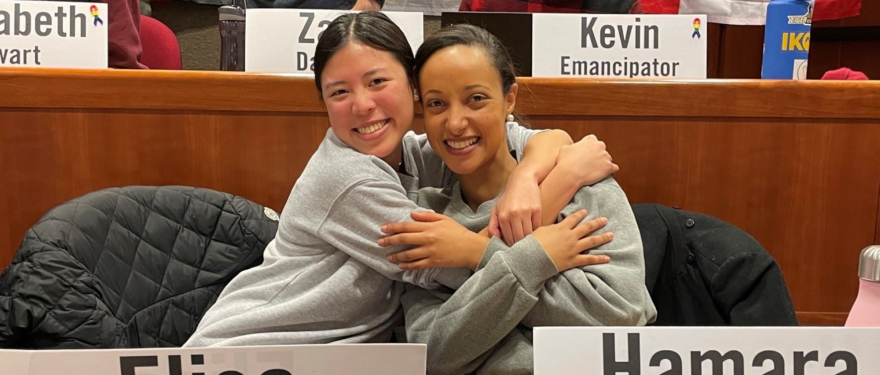Elisa Djuhar (MBA 2023) is from Singapore. She has a Bachelor’s Degree in Food Science from Cornell University. Before HBS, she oversaw research and development, and quality and safety of food products at various CPG companies.
Never in my wildest dreams did I ever think that I’d get into Harvard, let alone HBS. I didn’t apply to Harvard for undergrad because I was too intimidated, and I almost did the same for HBS. I thought it’d be a waste of time, effort, and money because I’d get rejected anyway. But I am so glad I did apply! I’ve never been in such a diverse, stimulating, and inspiring environment. I’ve learned so much, I’ve been challenged and pushed outside of my comfort zone, and I’ve grown in ways that I could not have imagined.
Here are 5 lessons I’ve learned from my first year at HBS:
1. People are less intimidating than you think.
When you bring 1,010 of the brightest, most accomplished, motivated students together, it is not surprising that many suffer from imposter syndrome. What is surprising, though, is that many think that they have the REAL imposter syndrome, while everyone else’s imposter syndrome is either not justified or is not real.
Yes, everyone is smart and accomplished. Yes, I have my anxieties, and so do others, but it’s okay because everyone is in the same boat. At HBS, a diverse student body means people with experience in every field imaginable. As a result, the learning experience is rich and unparalleled. After all, HBS is composed of inspiring, but imperfect, humans, and that’s the beauty of the HBS experience.
2. Everyone has a story to tell.
What distinguishes individuals at HBS are lived experiences, unique perspectives, and stories to tell. The summer before HBS, I sought advice from rising ECs (second-year students) and alumni on how I should spend my time as an MBA student. A recurring piece of advice was “get to know your classmates beyond the classroom.” HBS does a great job at encouraging deep conversations among students – including through MyTakes, Evolve Groups, continuing conversations, and sessions during orientation. But beyond these, I’ve sought to learn about my classmates through 1-on-1 conversations and small group dinners. Through their stories, I’ve gained tremendous perspective. I’ve learned empathy and graciousness, and I’ve gained awareness of my privileges. I’ve also been challenged with viewpoints different from mine. Sometimes our debates reach a conclusion, but most of the time they don’t, and my friends and I agree to disagree. Yet, these challenging conversations leave much food for thought and I often leave enlightened, inspired, and grateful for the diversity of thought.
It is through these conversations that I have been able to cultivate genuine bonds and unique memories with classmates that will last beyond HBS.
3. It’s okay to say “no.”
The first year can be demanding and draining – physically, emotionally, mentally, and financially. I’ve learned that it’s important to prioritize your time between a social life, academics, career, and most importantly, yourself. You have to give yourself time to reset and recuperate – whatever that means to you.
I’ve learned what is important to me and what is not, and that saying “no” is okay. Ultimately, there’ll be many moments in our lives when we find ourselves at crossroads. For me, HBS has been a great opportunity to practice reconnecting with myself, my values, and beliefs for these future crossroads.
4. There’s never a right answer, but have an opinion.
The HBS case method pushes students to step into the shoes of protagonists to make critical decisions in the face of conflict, uncertainty, and ambiguity. There are some cases where I come to class extremely confident that my viewpoint is the only right one. In class, however, my stance swings like a pendulum as I hear classmates’ eloquent arguments and personal experiences. Professors probe insights and assumptions and encourage productive debate, and I realize that my initial viewpoint may be flawed, and that others may have more compelling arguments.
What the case method has taught me is that often there isn’t a right answer. The case presents information that, depending on one’s background, experiences, and culture, can lead to individual conclusions. Yet, what is important is being able to distill relevant information from the case, to then develop and defend an opinion. At the same time, I learned that there are always tradeoffs to every decision made, and actively listening to the diversity of perspectives is crucial.
5. With privilege comes responsibility.
Studying at HBS is a privilege. And even after my first year, I still have not quite accepted the fact that I have the opportunity to study here. However, this privilege is a result of being born to supportive parents who pushed me to do my best in school and extracurricular activities, being able to benefit from strong education systems in safe environments, and having managers who trusted me to take on large responsibilities and projects early during my career. If any of these had not happened, I probably would not have been where I am today.
At HBS, I’ve become more aware and convinced that given our privilege, we ought to give back to those who have helped us along the way, and pay it forward to those who do not and cannot have the same privileges as we do. HBS’s mission is to “educate leaders who make a difference in the world.” We learn from guest speakers, alumni, professors, and students who will be future leaders. With this knowledge and network I feel more empowered to make a positive difference in the world, and less intimidated by the global challenges that await us.

